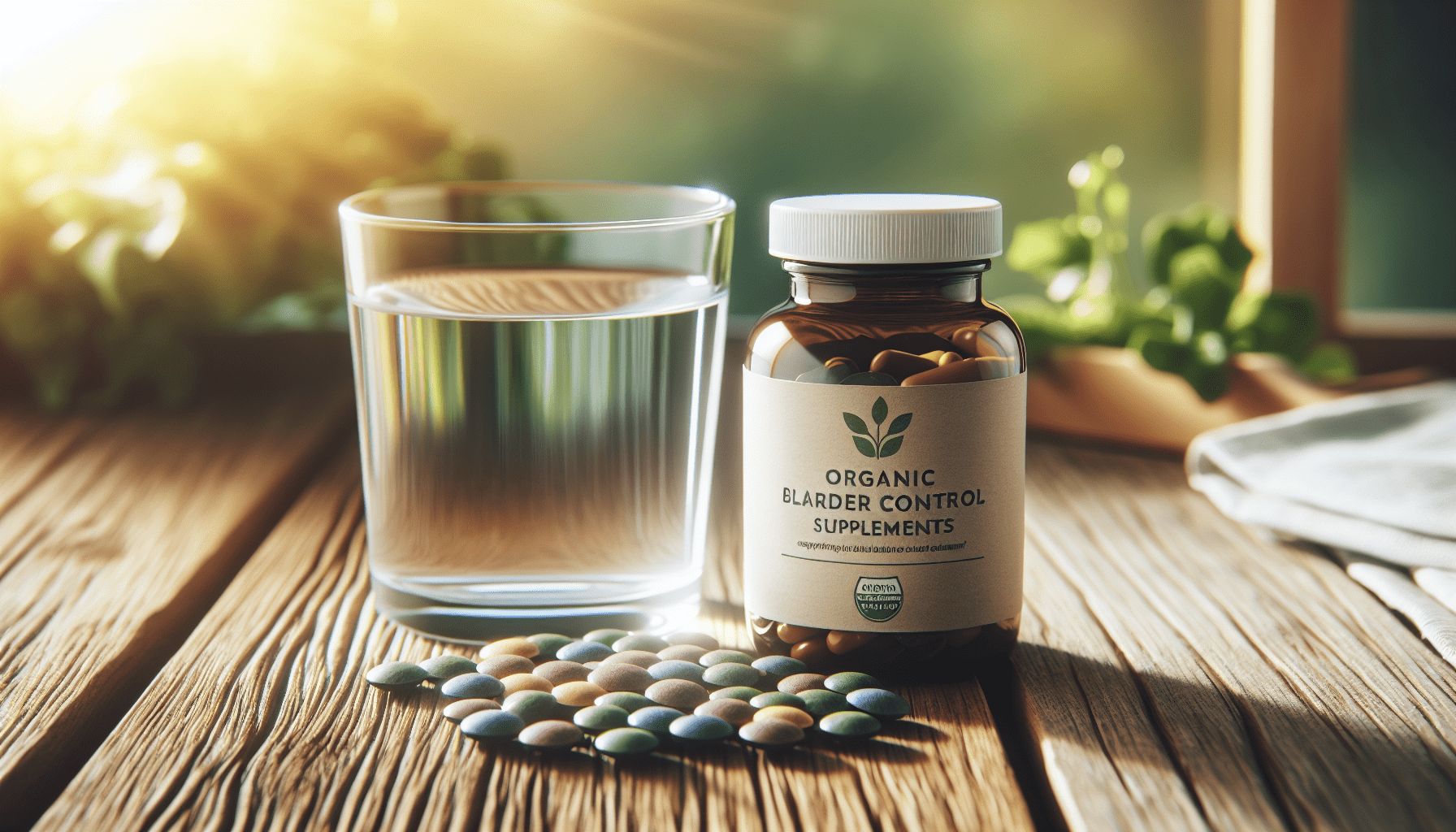Have you ever found yourself worrying about bladder control as you get older? It’s a common concern that affects many people, and navigating your way through all the information out there can be daunting. Thankfully, there are ways to restore normal bladder control as you age, and a variety of supplements can help manage and even alleviate symptoms of incontinence. Let Anne Tyler’s insights guide you in understanding the best approaches and supplements for improving bladder control.

Understanding Bladder Control and Its Challenges
Table of Contents
Bladder control isn’t something you think much about—until it becomes a problem. The primary task of your bladder is to store and expel urine, a function we mostly take for granted. But aging can bring challenges such as weakened muscles and nerves, leading to issues like an overactive bladder and incontinence.
What Causes Bladder Control Issues?
Several factors contribute to bladder control problems, especially as you age:
- Weak pelvic floor muscles: These muscles support your bladder and help control urination.
- Nerve damage: Conditions like diabetes, stroke, or surgeries can affect the nerves that communicate with the bladder.
- Hormonal changes: Particularly in women, menopause can reduce estrogen levels, impacting bladder function.
- Chronic health issues: Obesity and chronic urinary infections can exacerbate bladder control problems.
Recognizing these causes helps you understand why supplements might be necessary and beneficial.
Can an Overactive Bladder Be Cured?
An overactive bladder can often be managed, if not entirely cured. Treatments range from lifestyle changes and physical therapy to medications and supplements. It’s essential to talk to your healthcare provider to determine the best course of action for your situation.
Natural Approaches to Bladder Control
Before diving into supplements, let’s explore some natural methods that can support bladder health and control.
Pelvic Floor Exercises
Pelvic floor exercises, commonly known as Kegels, strengthen the muscles that control urination. Regular practice can help both men and women improve their bladder control.
Diet and Hydration
What you consume affects your bladder. Reducing urinary irritants such as caffeine, alcohol, and spicy foods can make a significant difference. Also, staying well-hydrated with water, rather than sodas or coffee, supports bladder function.
Bladder Training
This involves scheduling your bathroom visits and gradually extending the time between them. Bladder training can help your bladder hold more urine and reduce the urgency to go.
Best Bladder Control Supplements
Now, let’s turn to the supplements that have shown promise in restoring bladder control. The market is flooded with options, so understanding which ones are most effective can save you time and money.
Pumpkin Seed Extract
Pumpkin seed extract is known for its ability to support urinary health. It contains essential fatty acids and phytoestrogens that can improve bladder function. Pumpkin seed extract helps strengthen pelvic floor muscles and reduces urinary frequency.
Saw Palmetto
Saw palmetto is often used for urinary symptoms associated with an enlarged prostate in men. However, it also shows benefits in women for supporting overall urinary tract health.
Magnesium
Magnesium helps muscle function, including those in your bladder. It can help reduce bladder muscle spasms, which are common in overactive bladder conditions.
Cranberry Extract
While commonly used to prevent UTIs, cranberry extract can also improve bladder health. It helps prevent bacteria from sticking to the bladder wall, reducing the risk of infections that can exacerbate incontinence symptoms.
L-Arginine
L-Arginine is an amino acid that improves blood flow, which can help strengthen bladder muscles. It’s often used in combination with other supplements for best results.
Vitamin D
Studies have shown that low levels of Vitamin D are linked to an increased risk of pelvic floor disorders, including bladder control problems. Supplementing with Vitamin D can support overall muscle function.
Below is a table summarizing some common bladder control supplements and their benefits:
| Supplement | Benefits |
|---|---|
| Pumpkin Seed Extract | Strengthens pelvic floor muscles and reduces urinary frequency |
| Saw Palmetto | Supports overall urinary tract health, especially in men |
| Magnesium | Reduces bladder muscle spasms |
| Cranberry Extract | Prevents bacteria from sticking to the bladder wall, reducing infection risk |
| L-Arginine | Improves blood flow and strengthens bladder muscles |
| Vitamin D | Supports overall muscle function and reduces risk of pelvic floor disorders |

Combining Supplements and Lifestyle Changes
For the best results, consider combining supplements with natural approaches. Here’s a plan you might follow:
- Start with Pelvic Floor Exercises: Spend a few minutes each day practicing Kegels.
- Modify Your Diet: Cut back on caffeine and alcohol while increasing your water intake.
- Bladder Training: Schedule bathroom visits and gradually extend the time between them.
- Incorporate Supplements: Choose supplements based on your specific needs and ideally, after discussing with a healthcare provider.
A Sample Daily Routine
To give you a clearer picture, here’s a sample daily routine:
- Morning: Take magnesium and Vitamin D supplements.
- Throughout the Day: Drink plenty of water, perform Kegels, and practice bladder training.
- Evening: Take pumpkin seed extract and L-Arginine.
When to Seek Medical Advice
While supplements and lifestyle changes can be effective, they aren’t a cure-all. If your bladder control issues persist, it’s crucial to seek medical advice for a comprehensive evaluation and treatment plan.
Understanding Medical Options
Medical treatments include medications, physical therapy, and in some cases, surgery. Your doctor may prescribe anticholinergic medications to relax your bladder or suggest Botox injections. Physical therapy might involve biofeedback or electrical stimulation to strengthen pelvic muscles.
Here’s a summary of various medical treatments:
| Treatment | Description |
|---|---|
| Anticholinergic Medications | Relax bladder muscles and reduce urgency |
| Botox Injections | Reduce urinary incontinence by relaxing the bladder |
| Physical Therapy | Techniques include biofeedback and electrical stimulation |
| Surgery | Options like sling surgery for severe cases |
Psychological Impact and Coping Strategies
It’s important to acknowledge that bladder control issues can affect your mental well-being. Feelings of embarrassment and frustration are normal but can be mitigated with proper strategies.
Open Communication
Discussing your condition with loved ones or a support group can relieve emotional stress. You’re not alone, and sharing experiences can be therapeutic.
Mindfulness and Relaxation
Engaging in mindfulness practices like meditation can help manage stress. Stress and anxiety can exacerbate bladder control problems, so finding ways to relax is crucial.
Conclusion
Restoring normal bladder control as you age involves a multi-faceted approach. While supplements can play a significant role, combining them with lifestyle changes and natural methods often yields the best results. Always consult with a healthcare provider to find a tailored plan that suits your unique needs. Remember, you have options and support in managing and improving your bladder health.
By understanding and addressing the underlying causes, you can take proactive steps toward a life less burdened by bladder control issues.





